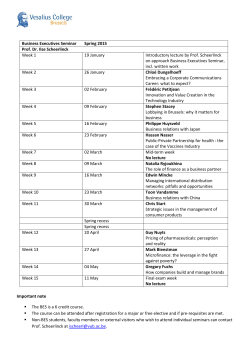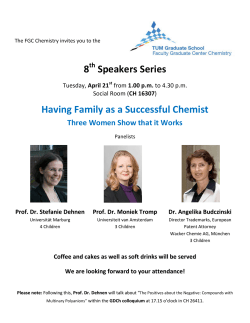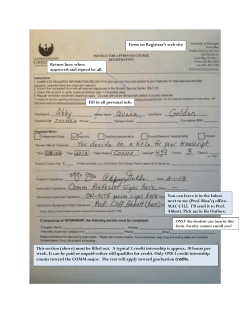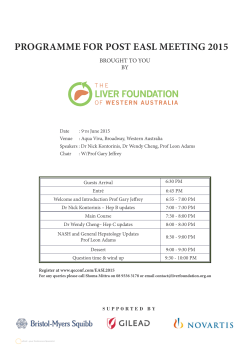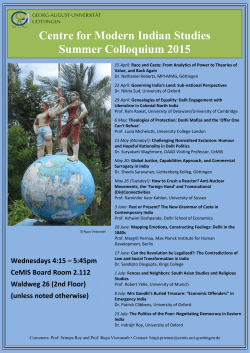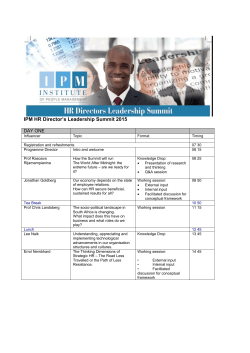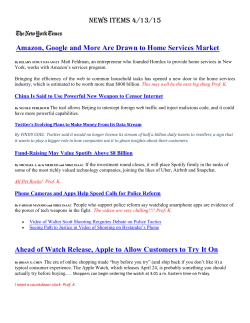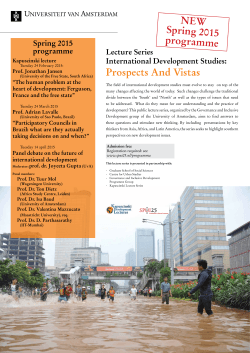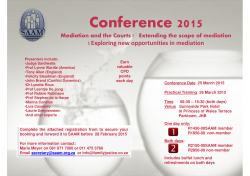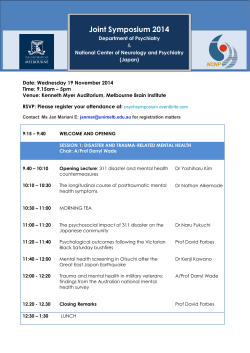
Biographical information of scientific presenters
Emerging and Persistent Infectious Diseases: Focus on Mitigation University of Edinburgh Edinburgh, Scotland Oct. 23–26, 2011 Biographical Information of Scientific Presenters Prof. Sir Roy Anderson, F.R.S., F.Med.Sci. Prof. Sir Roy Anderson is Professor of Infectious Disease Epidemiology at Imperial College, University of London. He recently spent three years on secondment as Chief Scientific Adviser to the U.K. Ministry of Defence, returning to Imperial in 2007. Additionally, he was the Rector of Imperial College from 2008 to 2009. Prior to his post at Imperial, Sir Roy was head of the Department of Zoology at the University of Oxford and served as Director of the Wellcome Trust Centre for the Epidemiology of Infectious Disease. His principal research interests are epidemiology, biomathe1matics, demography, parasitology, immunology, and health economics. His current research includes work on diseases, such as bovine spongiform encephalopathy in cattle, scrapie in sheep, and bovine tuberculosis in cattle. Sir Roy has also worked for the European Commission, the Canadian and U.S. governments, and the U.S. National Academies. He currently chairs the science advisory board of the World Health Organization’s (WHO) Neglected Tropical Diseases (NTD) program, is a member of the Bill & Melinda Gates Foundation’s Grand Challenges advisory board, and chairs the Schistosomiasis Control Initiative advisory board (SCI) funded by the Gates Foundation. Additionally, he is a nonexecutive director of GlaxoSmithKline. Sir Roy is a Founding Fellow of the Academy of Medical Sciences, a Foreign Associate Member of the U.S. Institute of Medicine, a Fellow of the Royal Society, a Foreign Member of the French Academy of Sciences, and was knighted in 2006. Dr. Ilaria Capua, D.V.M., Ph.D. Dr. Ilaria Capua is Director of the Research Department of Comparative Biomedical Sciences at the Istituto Zooprofilattico Sperimentale delle Venezie, Legnaro, Italy, which hosts the National, Food and Agriculture Organization (FAO), and World Organisation for Animal Health (OIE) Reference Laboratory for avian influenza and Newcastle disease, and the OIE Collaborating Centre for Diseases at the Human-Animal Interface. Her group of more than 70 staff provides diagnostic expertise globally and conducts cutting edge research on influenza viruses and viral zoonoses. From 2005 to 2009, she was Chairman of OFFLU, the OIE/FAO network on animal influenza. In 2006 she launched the Global Initiative on Sharing All Influenza Data (GISAID) to share influenza virus sequences globally. Dr. Capua also has extensive experience coordinating international research projects funded by the European Commission (EC) and has worked closely with FAO managing Technical Cooperation Projects covering 40 countries. She is a member of the World Health Organization’s (WHO) Scientific and Technical Advisory Group on Influenza and a Stream leader within WHO’s Global Research Agenda on Influenza. In 2007, she was among the winners of the Scientific American 50 prize; in 2008 was included among Seed Magazine’s Revolutionary Minds, for leadership in science policy; and she is the 2011 awardee of the Penn Vet World Leadership Award. Dr. Michael Doyle, Ph.D. Dr. Michael Doyle is Regents Professor of Food Microbiology and Director of the Center for Food Safety at the University of Georgia. His research focuses on bacterial foodborne pathogens including Escherichia coli O157:H7 and other serotypes of enterohemorrhagic E. coli, Salmonella spp., Campylobacter jejuni, Listeria monocytogenes, Staphylococcus aureus, and Clostridium botulinum. Dr. Doyle has more than 30 years of experience in Food Safety Research and Initiatives, and has published more than 400 scientific papers on food microbiology and food safety topics. Dr. Doyle holds the patents to several sanitation products developed at the University of Georgia. He was the recipient of a 2010 University of Georgia Research Foundation Inventor’s Award for his invention of a food wash that significantly reduces the risk of foodborne illnesses. Additionally, in 1996, he received a Nicholas Appert Award of the Institute of Food Technologists (IFT) for preeminence in, and contributions to, the field of food technology. Dr. Doyle is a member of the Institute of Medicine of the National Academies and is the chair of the Institute of Medicine’s Food Forum. He is a fellow of the American Academy of Microbiology, the International Association for Food Protection and the IFT. Dr. Robert Gallo, M.D. Prof. Robert Gallo is Founder and Director of the Institute of Human Virology (IHV) at the University of Maryland. Prior to this role, he spent 30 years at the National Institutes of Health's National Cancer Institute, where he was head of its Laboratory of Tumor Cell Biology. Dr. Gallo is renowned for his research on HIV, most notably his co-discovery in 1984 that HIV is the cause of AIDS. His research has been instrumental to the development of HIV blood tests and HIV therapies. In 1996, his discovery that a natural compound known as chemokines can block HIV and halt the progression of AIDS was hailed by Science magazine as one of that year’s most important scientific breakthroughs. Dr. Gallo’s current work at the IHV combines the disciplines of research, patient care, and prevention programs in a concerted effort to speed the pace of medical breakthroughs. Dr. Gallo has authored more than 1,200 scientific publications, as well as the book "Virus Hunting: AIDS, Cancer & the Human Retrovirus: A Story of Scientific Discovery." Dr. Gallo has been awarded 29 honorary doctorates and was twice a recipient of the Albert Lasker Clinical Medical Research Award (1982 and 1986). He is a member of the National Academy of Sciences and the Institute of Medicine. Dr. John Glass, Ph.D. Dr. John Glass is a Professor in the Synthetic Biology Group at the J. Craig Venter Institute (JCVI), where he directs the Mycoplasma Biology team. He is also an adjunct faculty member of the University of Maryland at College Park Cellular and Molecular Biology Program. Prior to this role, he spent five years in the Infectious Diseases Research Division of the pharmaceutical company Eli Lilly, where he directed a Hepatitis C virology group and a microbial genomics group. At JCVI, Dr. Glass has led research on mycoplasma minimal genome and genome transplantation projects, as well as environmental genomics and viral metagenomics work. Notably, his team has been responsible for the creation of a synthetic bacterial cell. These developments are now being used to create cells and organelles with redesigned genomes to make microbes that can produce biofuels, pharmaceuticals, and industrially valuable molecules. In addition, Dr. Glass is currently leading a Venter Institute effort that uses synthetic genomics methods to improve the speed of production and efficacy of influenza virus vaccines. Prof. Shuan Kennedy, B.S.Ch.E. Prof. Shaun Kennedy is Director of the National Center for Food Protection and Defense (NCFPD). Additionally, he is the Director of Partnerships and External Relations of the University of Minnesota's College of Veterinary Medicine, and an Assistant Professor in the Department of Veterinary Population Medicine. Since joining the university, he has taken a leadership role in advancing research in animal health, food safety, and food-system biosecurity. Prior to these roles, Prof. Kennedy was the Vice President of Global Food and Beverage Research and Development at Ecolab, where he led his organization in developing a wide range of animal-health and food-safety technologies. These included novel sanitizers, FDAapproved process additives, new sanitation technologies, and animal health products. He has also held executive positions at Procter & Gamble. Prof. Kennedy provided the inaugural lecture in the Food and Drug Administration’s (FDA) Chief Scientist Lecture series and has served on several European Commission projects on food-system protection. Additionally, he received the FDA Commissioner’s Special Citation for advancing food defense. Prof. Joyce Tait, C.B.E., F.R.S.E., Ph.D. Prof. Joyce Tait is the Innogen Scientific Advisor in the ESRC Innogen Centre, School of Social and Political Sciences at the University of Edinburgh. Previously, she was the Director of the Innogen Centre. Prof. Tait has an interdisciplinary background in natural and social sciences with concentrations in: developments in life sciences; strategic and operational decision-making in companies and public bodies; policy analysis; risk assessment and regulation; foresight; and public attitudes and communication. Her current research foci include genetically modified (GM) crops, cell therapies, the agro-biotechnology and pharmaceutical industries and their governance, and synthetic genomics. Prof. Tait is on the board of directors of the Scottish Stem Cell Network, a member of the board of the Roslin Foundation, and a member of the Scientific and Technical Council of the International Risk Governance Council. She has previously held appointments on a number of different bodies including the Nuffield Council on Bioethics, the Scottish Science Advisory Council, and the U.K. Food Standards Agency’s GM Dialogue Steering Group. She is a fellow of the Royal Society of Edinburgh, a fellow of the Society for Risk Analysis, and has received a Commander of the British Empire (C.B.E.) award for her services to social science. Prof. Kasisomayajula “Vish” Viswanath, Ph.D. Prof. Vish Viswanath is an Associate Professor in the Department of Society, Human Development, and Health at the Harvard School of Public Health (HSPH) and in the Division of Population Sciences at the Dana-Farber Cancer Institute (DFCI). He is the Faculty Director of the Health Communication Core of the Dana-Farber/Harvard Cancer Center (DF/HCC), and CoLeader of the Cancer Risk and Disparities (CaRD) Program of DF/HCC. Prof. Viswanath also chairs the Steering Committee for the Health Communication Concentration at HSPH. His additional appointments include: Director, Enhancing Communication for Health Outcomes (ECHO) Laboratory, DF/HCC; and Associate Director, Lung Cancer Disparities Center, HSPH. His primary research is in documenting the relationship among communication inequalities, poverty, and health disparities. He has written more than 110 journal articles and book chapters concerning communication inequalities and health disparities, public health communication campaigns, e-health and the digital divide, public health preparedness, and the delivery of health communication interventions to underserved populations. He is the co-editor of three books: Mass Media, Social Control and Social Change, Health Behavior and Health Education: Theory, Research & Practice, and The Role of Media in Promoting and Reducing Tobacco Use. Prof. Viswanath also is editor of the Communication and Social and Behavioral Change section of the 12-volume International Encyclopedia of Communication.
© Copyright 2025
